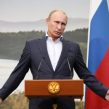
BIG BUSINESS IS INVITED TO THE KREMLIN FOR FRESH INSTRUCTIONS
Publication: Eurasia Daily Monitor Volume: 4 Issue: 30
By:

Following Russian President Vladimir Putin’s well-established ritual of demonstrating his power to loyal subjects, his annual meeting with business leaders was far heavier on symbolism than on substance. Most of the two dozen CEOs and owners of Russia’s largest companies who were invited to the meeting in the Kremlin on February 6 remember vividly a similar event four years ago when Mikhail Khodorkovsky of Yukos raised his voice against rampant bureaucratic corruption – and was duly marked an “enemy of the state.” Their organization, officially called the Russian Union of Industrialists and Entrepreneurs but unofficially known as the “oligarch’s trade union,” even tried to protest Khodorkovsky’s arrest in October 2003 until Putin demanded they “stop the hysterics” (Nezavisimaya gazeta, February 7).
This time around Putin spoke about developing and upgrading Russia’s industrial base. Barely a few weeks ago, Dmitry Medvedev, first deputy prime minister and Putin’s hopeful successor, announced at the World Economic Forum in Davos that Russia planned to become the top oil producer in the world. Putin, however, spelled his doubts about these ambitious plans: “Truth be told, I am not sure whether we need this.” Just a year ago Vladislav Surkov, known as the main “ideologist” at Putin’s court, justified the reliance on “energy power” with irrefutable arguments: “If you have strong legs you should compete in the long jump and not play chess” (Ezhednevny zhurnal, March 3, 2006). Now Putin has set course toward diversifying the economy and prioritizing high value-added activities, since “Russian industry’s accent on raw materials increases its dependence on foreign markets and on the fluctuations of world prices. And Russia has already seen more than once how destructive, and sometimes how devastating, this dependence can be for the national economy.”
The “captains of industry” expressed their full agreement with these wise words and reported their plans for adding value in every technologically feasible way (Kommersant, Vedomosti, February 7). They were probably quite relieved not to hear again reminders about their “social responsibility,” which in essence means donations to particular state agencies, including the National Anti-Terrorist Committee, and funding Kremlin “pet projects,” like sport facilities in Sochi to strengthen the city’s bid to host the Winter Olympic Games in 2014. They also know full well that the presidential instruction “to produce full-value high-tech products for foreign markets” has little — if any — practical meaning (Expert, February 6).
Plans to focus the economy on exports of raw materials are perfectly compatible with Putin’s over-centralized system of power. The colossal bureaucratic machine thrives on its control over financial flows and thus stifles investment. It is only natural that industrial production is the slowest growing sector of the Russian economy, with a 3.9% increase in 2006 against 6.7% GDP expansion (Polit.ru, February 6). There are many specific factors determining this lag, from the shortage of qualified labor to the deficit of electric energy, but it is the domination of Byzantine politics over economics that creates the major disincentive for modernizing the industrial base. Visiting India recently, Putin was impressed with its dynamism, but he failed to see how they were connected with reforms that had greatly reduced bureaucratic regulations and with the country’s proudly cultivated democratic tradition (Kommersant, January 25).
Putin’s attempt to order the flagships of Russian business to modernize makes little sense even as a PR exercise, but one peculiar coincidence illustrates its emptiness with stark clarity. As invitations were issued to the most successful entrepreneurs, new charges were brought against Mikhail Khodorkovsky and his business partner, Platon Lebedev, on top of the eight years they are currently serving in labor camps (Vremya novostei, February 7). They are now accused of embezzlement and money laundering in the astronomic range of $25 billion. Khodorkovsky shows no intention of bending before this overwhelming force, and his fight to preserve his dignity recently convinced the Moscow Helsinki Group to grant him the status of “political prisoner” and add his name to the long list of Russian dissidents and victims of political repressions (Ekho Moskvy, February 7).
The business elite that gathered in the Kremlin hoped that their submissiveness would help them avoid Khodorkovsky’s fate, but they have now a new worry about the durability of their informal “keep-quiet-and-let-live” contract with Putin (Novaya gazeta, February 8). Indeed, his fast-approaching exit from the Kremlin gates could unleash a fierce scramble between competing gangs of courtiers followed by a large-scale re-distribution of property by the winning camp. The so-called oligarchs, while formally staying outside politics, have to place their bets in this clash among the real oligarchs – Putin’s lieutenants in charge of special services and law enforcement agencies (Gazeta.ru, February 7). The CEOs of Lukoil, Rusal, Severstal, Sistema, and other top Russian companies sought reassurances from the president that he would keep the fighting bulldogs under the carpet – which neatly coincides with his own plans to orchestrate a smooth succession by postponing his choice for as long as possible. His hand, however, can be forced by some carefully arranged “events,” so no personal reassurance can really secure the owners of assets worth billions of U.S. dollars against swift expropriation when the chosen successor takes power.




